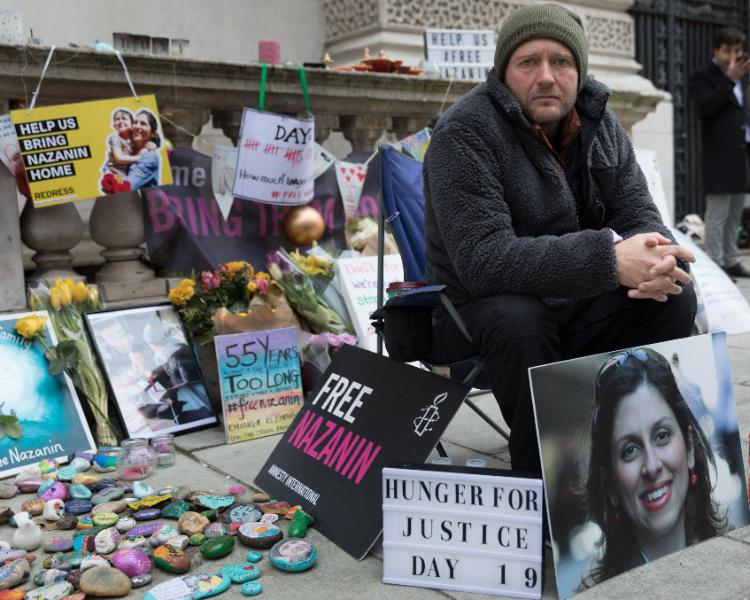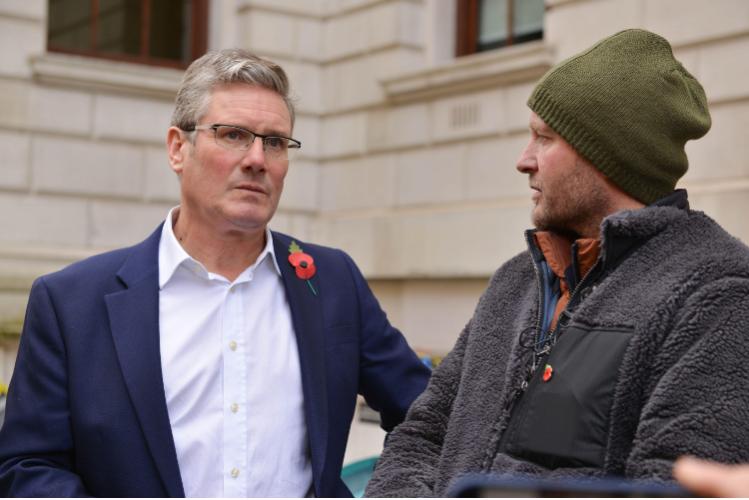"It's a new Middle Ages": The Richard Ratcliffe interview
Richard Ratcliffe (Credit: Russell Moore / Alamy Stock Photo)
7 min read
Richard Ratcliffe spent years urging the UK government to do more to release his wife, Nazanin, from Iranian detention. He tells Sophie Church that Parliament needs to follow the US Congress in ensuring sanctions hit hard and true
When Nazanin Zaghari-Ratcliffe, a British-Iranian national, was taken hostage in Iran in 2016, it sparked the beginning of an unfathomably painful attempt for her husband, Richard Ratcliffe, to bring her home. Years of relentless campaigning followed, with Ratcliffe constantly appealing to Foreign Office ministers to apply pressure on Iran. However, his cries for help – culminating in two hunger strikes – drifted down Whitehall, seemingly unanswered. Finally, in 2022, after the government paid off its historic debt to Iran, Nazanin came home.
The UK currently has more than 400 sanctions levelled at Iranian individuals over human rights violations. But today Ratcliffe says that, on sanctions, “UK policy is not fit for purpose”.
“I don’t think there has been any attempt to develop a strategy to challenge Iran’s hostage-taking, and to teach it lessons that say: this is a bad path,” he says. “I’ve seen no sanctions imposed that try to change state hostage-taking practices – none.”
While government may be stepping up the frequency of sanctions, Ratcliffe is concerned by the way they are employed.
“To date, we have seen sanctions used as a virtue signal, as a throat clearing, but not as an attempt to change behaviour of human rights,” he says.
 Richard Ratcliffe on hunger strike (Credit: amanda rose / Alamy Stock Photo)
Richard Ratcliffe on hunger strike (Credit: amanda rose / Alamy Stock Photo)
Take the sanctions programme announced in December, that neatly coincides with the 75th anniversary of the Universal Declaration of Human Rights, for example. “The political and diplomatic realm are both quite short term and tactical: ‘What’s a useful signal to send right now for next week?’” Ratcliffe says. “Actually it ends up being done around landmarks, so the risk is it becomes more ritualistic.”
Ratcliffe adds that the general practice of the Foreign Office is to “watch what’s going on, then just steer the rudder very gently”. This cautiousness – a cultural instinct to “keep our powder dry” – led to his wife being detained for longer, he says.
We’re seeing state hostage-taking increase... It’s a new Middle Ages
“If you look at the way [the Foreign Office] will always talk about Nazanin’s case, it would always refer to it as a consular case, not as a hostage case, not even as detention or unfair imprisonment,” he says. “It took them more than three years to acknowledge any violation of human rights.”
As Ratcliffe has learnt, a consular case means that one country would have to respect the other’s sovereignty in trying to provide assistance to its citizen. If, however, it is a human rights case – which should cover hostage-taking – states would have to abide by stronger overarching human rights law. “It’s not OK to say these are consular cases,” Ratcliffe says. “That’s Pontius Pilate stuff.”
This “managing of symptoms” would see the Foreign Office playing doctor with families: solemnly telling loved ones that there was nothing more they could do. “Essentially it was a tragedy, but not that different from having a rare tropical disease that the NHS has not got the drugs for – ‘it’s not nice, we’ll hold your hand, but…’,” he trails off.
The House meets Ratcliffe just after the government announced seven individuals and one organisation in Iran would be sanctioned for threatening to kill international journalists on UK soil. Is this not progress?
“It’s a genuinely good thing, because the sanctions have been enacted to put some sort of line in the sand,” he says. However, he adds: “One swallow doesn’t make a summer. That was still a diplomatic act. I don’t think you would look at it and think that was done in direct consequence to the actions of the Iranians; that was done to the reporting of the actions of the Iranians, and in a context where there’s a wider diplomatic piece going on with Iran.”
The case of Vahid Beheshti – the British-Iranian activist who went on hunger strike outside the Foreign Office over the government’s failure to proscribe the Islamic Revolutionary Guard Corps as a danger to British society – is proof nothing has changed, he says.
Ratcliffe criticises how sanctions are deployed – often arriving too late for those who have turned to hunger strikes as a last resort. “It’s good that it got responded to and that those sanctions exist, but they have come quite late in the process.” Such directionless sanctioning, as Ratcliffe sees it, weakens the UK in the eyes of those in Iran, who are wearing sanctions like a “badge of pride”, and inevitably, are emboldened to go further.
“We’re seeing state hostage-taking increase, I think partly because of an unravelling. It’s a new Middle Ages,” he says. “It hasn’t completely exploded yet. The number of cases that you or I could name wouldn’t get beyond 10 fingers. But there’s now every chance that it will spiral.”
Coping with the whims of a ruthless regime on the one hand, while entreating a reluctant British government to act on the other, forced Ratcliffe, an accountant by trade, to pursue justice by his own means.
I’ve seen no sanctions imposed that try to change state hostage-taking practices – none
He describes the point during Nazanin’s detention where everyone was waiting: the Iranians, for the historic debt owed by the British; and the British, for the end of Nazanin’s sentence. “I thought, you can all wait but we can’t!” Ratcliffe says, still exasperated to this day.
It was at this time that Ratcliffe stumbled upon the Magnitsky sanctions, which are targeted at those responsible for human rights abuses and corruption. He made contact with campaign group Redress, the secretariat of the Magnitsky sanctions All-Party Parliamentary Group, and began the cathartic process of identifying those worthy of sanction in Iran.
“Developing the names was the cathartic bit,” he says. “And sitting down with other families and getting from each their testimony of: ‘there are lots of bad guys, but who are the worst guys?’
 Keir Starmer with Ratcliffe (Credit: ZUMA Press Inc / Alamy Stock Photo)
Keir Starmer with Ratcliffe (Credit: ZUMA Press Inc / Alamy Stock Photo)
“We all started writing and almost cross-referencing as to which were the repeat offenders.”
But Ratcliffe is aware that his involvement with the APPG, and his constant lobbying of government ministers, are responsibilities he never should have had.
“It shouldn’t be so unfair. It shouldn’t be on the families to lobby the minister. There should be a framework whereby, in your moment of need, you can turn to the state to provide. That’s what citizenship should be,” he says.
If policy is not fit for purpose, Parliament must ensure government is held responsible. “Parliament should be annually reviewing what the government does on sanctions and on hostages,” Ratcliffe says.
“If you look at the difference between the US and the UK, sanctions in the US are much more effective… You can submit names via Congress, and Congress will review the performance of the state department, as in: ‘on sanctions, how are we doing?’ And actually, that role is still missing from Parliament.”
Ratcliffe says we need a co-ordinated approach to state hostage-taking from the UK government.
This is echoed by Parliament’s Foreign Affairs Committee, whose chair, Alicia Kearns, says the establishment of a “director for arbitrary and complex detentions” role is one of the committee’s “biggest asks”.
Ratcliffe, now 48, still gets the “heebie jeebies” when walking past the patch of concrete where he staged his hunger strike, but he says he is “better now” than he was.
Having rallied MPs for so many years, would he ever want to become one himself? “No,” he says, before briefly reflecting on how those “intoxicating aspects of being on the telly” felt. However, the trolling he experienced – his campaign triggered public rage through his association with politicians, he supposes – confirm life in the spotlight is not for him.
For now, he is continuing his advocacy work. While his family’s fight may be over, he is continuing to support those families whose loved ones are still detained abroad.
“In some ways, when the problem gets big enough, people will realise they have to deal with it,” he says. “I hope that our advocacy can push that earlier, and that less suffering needs to happen.”
